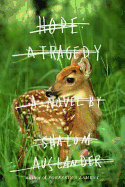
Solomon Kugel wants to start over: escape his orthodox Jewish upbringing, take his lately distant wife and sickly son to upstate New York and live quietly in a rural farmhouse, working his sales job in eco-composting. Happiness is not so easy, though. Since she has only a few months left to live, he reluctantly brings along his Holocaust-obsessed mother, and he also finds out that his new community is plagued by an arsonist--not to mention the rancid crone who claims to be Anne Frank living in his attic.
This preposterous scenario provides Shalom Auslander (the memoir Foreskin's Lament) all the infrastructure he needs to engage his substantial humor in philosophical skepticism. As Kugel's trusted adviser, Professor Jove, reminds him, "the greatest source of misery in the world... [is] neither disease nor race nor religion... it [is] hope. We are rational creatures... hope is irrational." Yet Kugel can't quite give up hope--that his son will recover, that his dementia-addled mother and the refugee Anne Frank in his attic will mercifully die, that his job will improve, and that his life indeed can get better.
Nonetheless, like Job, Kugel is a man battered from all sides. His boss downgrades him; he imagines his epitaph: "Solomon Kugel--His performance of late had been subpar.--Born, unfortunately. Died eventually." His sensitive stomach drives him to an expensive gluten-free diet. ("You paid more these days for the things you didn't get... with each ingredient that wasn't included, the price increased.") There is no suffering that Auslander can't make funny in a thought-provoking way. When Kugel grasps for salvation with the old saw "Hope springs eternal," the always cautionary Professor Jove replies: "It doesn't have to." --Bruce Jacobs, founding partner, Watermark Books & Cafe, Wichita, Kan.

